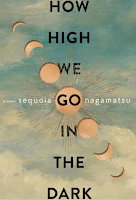I had a heck of a week last week. A list of things that happened: the first four days of the school year, a traffic ticket & car trouble, a stolen wallet, a lunch left in a ride share car, a trip to Iowa, and a general feeling of possibly being cursed? So in the midst of it all I obviously bought a book I had barely heard of before in an airport bookstore and read it in the space of the weekend. Emma Seckel’s The Wild Hunt is a haunting and harrowing historical adult fantasy, and it was an excellent escape from the world.
The islanders have only three rules: don’t stick your nose where it’s not wanted, don’t mention the war, and never let your guard down during October.
Leigh Welles has not set foot on the island in years, but when she finds herself called home from a disappointing life on the Scottish mainland by her father’s unexpected death, she is determined to forget the sorrows of the past—her mother’s abandonment, her brother’s icy distance, the unspeakable tragedy of World War II—and start fresh. Fellow islander Iain MacTavish, a RAF veteran with his eyes on the sky and his head in the past is also in desperate need of a new beginning. A young widower, Iain struggles to return to the normal life he knew before the war.
But this October is anything but normal. This October, the sluagh are restless. The ominous, bird-like creatures of Celtic legend—whispered to carry the souls of the dead—have haunted the islanders for decades, but in the war’s wake, there are more wandering souls and more slaugh. When a local boy disappears, Leigh and Iain are thrown together to investigate the truth at the island’s dark heart and reveal hidden secrets of their own.
Rich with historical detail and a skillful speculative edge, Emma Seckel’s propulsive and pulse-pounding debut The Wild Hunt unwinds long-held tales of love, loss, and redemption.
Leigh Welles is accustomed to loss—her mother disappeared into the sea
when she was ten and never came back, her brother left for university
soon afterward and then disappeared into the Second World War and never sailed back
home, she lost her own big city dreams in the slog of trying to make it
on the post-war mainland, and now she’s finally returned because her
father fell and drowned, and there’s a funeral to attend and a discarded
life to shake the dust off of and return to. Put all that together with
the fact that on their remote Scottish island, something uncanny happens
in October, and you have the setting for The Wild Hunt. How the next
month plays out—the unrest and cruelty of the sluagh (spirits who take
the form of crows and only appear in October) will either make or break
the island, and Leigh and those she loves will be closest to it all.
This
book does a lot: it is a post-war imagining, both pastoral and
historical. It is also speculative and literary, and dips into horror in
places as well. It succeeds as a narrative because of the pervasive
atmosphere Seckel creates within its covers. There’s an overarching
heaviness and darkness in Seckel’s tale, a countdown sounding in ominous
bass notes in the background, the unbearable weight of history and at
the same time tradition and superstition knocking up against the modern
world. There’s a sense of isolation that butts up against belonging, and
cloying despair battling it out with small moments of hope. I found it
fascinating, but I like a slow build and excessive world building. The
gathering unrest of it all—contained, quiet, and devastating, did not
feel fully resolved, but it did feel fitting. If you like stories that
slowly sink their claws into your psyche and leave small openings for
what may come next, you’ll like this book.
As mentioned above,
loss colors much of the narrative, and no one’s loss seems more personal
or immediate than Leigh’s…until you meet the wreck that is Iain
MacTavish, slowly sinking in a sea of guilt over death — those island
boys lost in the war, a wife lost in the Blitz, and survivors carried
away in senseless post-war slaughter, both memory- and sluagh-caused.
Seckel skillfully interweaves Leigh and Iain’s voices, dreams, pieces of
the past (long-gone and near), and other villagers’ perspectives to
create a poignant whole. The characterization rests against a foggy and
indistinct background, on some small Scottish isle — never positively
identified by name but described in eerie detail. Aside from loss, the
most immediate themes are the futility of war, legend and myth crossing
over into reality, and community identity. The fact that this story is
not easily categorized, but still succeeds, is a credit to Seckel’s
writing ability: neither spare nor overblown, and careful in its
urgency and construction.
In all, The Wild Hunt is convincing
and emotion-laden. It’s a trip straight into the past, into the liminal
spaces between worlds, and to an island held in the malevolent spell of mysterious
creatures and too-present grief.
Recommended for: fantasy fans
who enjoy a dark fantasy/horror vibe, readers who think mythology-meets-post-war-despair sounds intriguing, those who enjoy bird-based horror and myth, and anyone (quite
rightly!) obsessed with Scottish coastline, expertly and lovingly
described.















